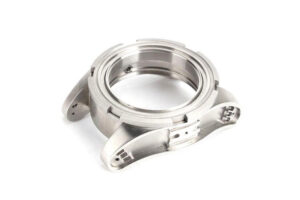Aluminum Precision CNC Machining: The Future of Manufacturing
 In today’s fast-paced world, precision and accuracy are the keys to success in any industry. The manufacturing industry is no exception, and the use of Aluminum Precision CNC Machining has revolutionized the way products are made. This technology has made it possible to produce high-quality, complex parts with incredible accuracy and speed. In this post, we will explore the benefits of Aluminum Precision CNC Machining and how it is shaping the future of manufacturing.
In today’s fast-paced world, precision and accuracy are the keys to success in any industry. The manufacturing industry is no exception, and the use of Aluminum Precision CNC Machining has revolutionized the way products are made. This technology has made it possible to produce high-quality, complex parts with incredible accuracy and speed. In this post, we will explore the benefits of Aluminum Precision CNC Machining and how it is shaping the future of manufacturing.
What is Aluminum Precision CNC Machining?
Aluminum Precision CNC Machining is a manufacturing process that uses computer-controlled machines to produce high-precision parts from aluminum. The process involves cutting, drilling, and shaping aluminum blocks into the desired shape using a computer-controlled machine. The machine is programmed to follow a specific set of instructions, which ensures that the final product is accurate and precise.
Benefits of Aluminum Precision CNC Machining
1. High Precision and Accuracy
One of the most significant benefits of Aluminum Precision CNC Machining is its ability to produce high-precision parts with incredible accuracy. The computer-controlled machines can produce parts with tolerances as low as 0.001 inches, which is impossible to achieve with traditional manufacturing methods. This level of precision ensures that the final product is of the highest quality and meets the exact specifications of the customer.
2. Cost-Effective
It is a cost-effective manufacturing process. The machines can produce parts quickly and accurately, which reduces the need for manual labor and saves time and money. The process also reduces the amount of waste produced, which further reduces costs.
3. Versatility
It is a versatile manufacturing process that can produce a wide range of parts. The machines can produce parts of different shapes and sizes, and the process can be used to produce both simple and complex parts. This versatility makes it an ideal manufacturing process for a wide range of industries, including aerospace, automotive, and medical.
4. Consistency
Aluminum Precision CNC Machining produces parts that are consistent in quality and accuracy. The computer-controlled machines follow a specific set of instructions, which ensures that each part produced is identical to the previous one. This consistency is essential in industries where quality and accuracy are critical.
5. Speed
It is a fast manufacturing process. The machines can produce parts quickly and accurately, which reduces the time it takes to produce a product. This speed is essential in industries where time is of the essence, such as aerospace and automotive.
The Future of Manufacturing
It is shaping the future of manufacturing. The technology is becoming more advanced, and the machines are becoming more sophisticated. This means that the process will become even more precise, versatile, and cost-effective in the future.
The use of it is also reducing the need for manual labor, which is a significant benefit in industries where labor costs are high. The process is also reducing the amount of waste produced, which is essential in industries where sustainability is a priority.
CNC Machining Services
|
Tolerance
|
+/-0.005 – 0.01mm(Customize avaiable)
|
|||
|
Surface Roughness
|
Ra0.2 – Ra3.2(Customize avaiable)
|
|||
|
Materials Avaiable
|
Such as aluminum, copper, stainless steel, iron, PE, PVC, ABS, etc.
|
|||
|
Surface Treatment
|
Such as polishing, general oxidation, hard oxidation, color oxidation, surface chamfering, tempering, quenching, etc.
|
|||
|
Processing
|
CNC Machining,CNC Turning, anodized Milling, turning-milling compound, drilling, auto lathe, tapping, bushing, surface treatment, etc.
|
|||
Conclusion
Aluminum Precision CNC Machining is a game-changer in the manufacturing industry. The technology has revolutionized the way products are made, and its benefits are undeniable. The process is precise, versatile, cost-effective, consistent, and fast, making it an ideal manufacturing process for a wide range of industries. As the technology continues to advance, the future of manufacturing looks bright.






